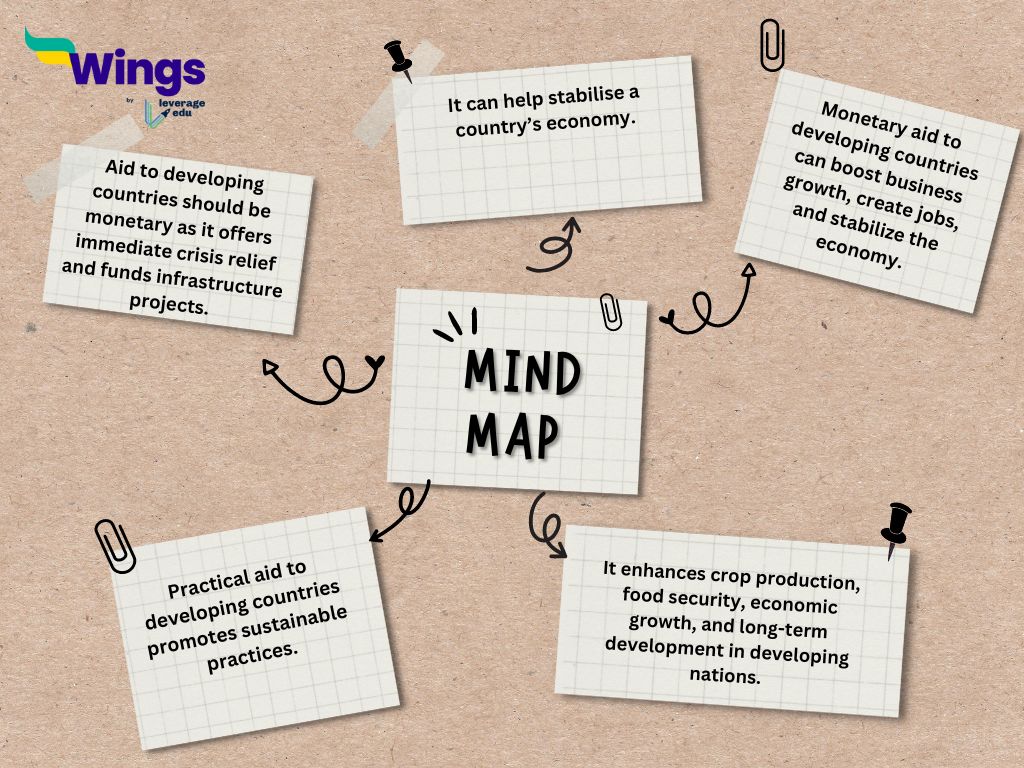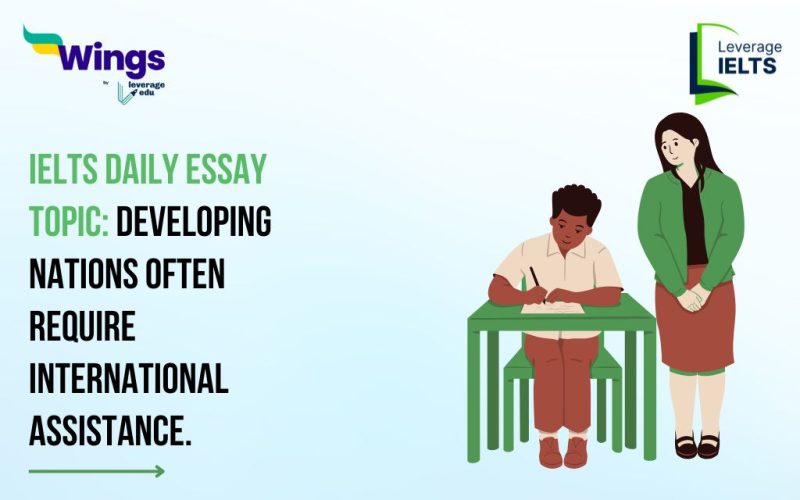Brainstorming Ideas
Refer to the following brainstorming ideas to get a better understanding of the answer.
Reasons for believing that the assistance provided to the developing countries should be monetary:
- Provides immediate relief in the situations of crisis.
- Helps fund infrastructure projects.
- It can help stabilise a country’s economy.
- This can help stimulate business growth, create job opportunities and foster a more stable economic environment.
Reasons for believing that the assistance provided to the developing countries should be in the form of practical help and advice:
- Developed countries should share expertise and technology by providing education and training, and helping in developing sustainable practices.
- It can also help in increasing crop production, improve food security and boost the economy.
- This can help developing nations build capacity leading to long-term growth and development.

Q. Developing nations often require international assistance. Many believe that this assistance should be monetary, while some think practical help and advice would be more beneficial. Discuss both these views along with your opinion.
Ans. Developing nations often find themselves in, the need of international assistance to foster growth and stability. The form this assistance should take, however, is a matter of debate. Some people argue for monetary aid, while others advocate for practical help and advice. I believe that providing practical help and advice would be more beneficial for developing countries.
Monetary assistance, in its various forms, can provide immediate relief in situations of crisis and fund infrastructure projects. For instance, collected funds can be allocated to build schools, hospitals and roads. These are tangible improvements that can improve economic growth and quality of life for citizens. Moreover, financial aid can help stabilise a country’s economy by supporting its policies and providing money for investments. Consequently, this can stimulate business growth, create job opportunities and foster a more stable economic environment.
On the other hand, critics argue that monetary aid can lead to dependency and may not always reach the people who need it the most due to corruption or inefficient distribution systems. They suggest that the practical advice will be more beneficial in the long run. This could mean sharing expertise and technology providing education and training, and helping in developing sustainable practices. For example, agricultural experts from developed countries can train farmers in developing nations and modern farming techniques. This can increase crop production, improve food security and boost the economy. This approach ensures practical help and advice that will be more effective for developing nations. It is based on the principle of “teaching a man to fish” rather than “giving him a fish.” By sharing expertise, technology, and skills, developed nations can help build capacity in developing countries, leading to long-term growth and development.
In conclusion, while there are valid arguments for both monetary aid and practical help, a balanced approach that combines both forms of assistance could offer the most benefits to developing nations. This approach would not only address immediate needs but also foster long-term development and self-sufficiency.
Analysis
Paraphrased Statement: Developing nations often find themselves in, the need of international assistance to foster growth and stability. The form this assistance should take, however, is a matter of debate. Some people argue for monetary aid, while others advocate for practical help and advice.
Thesis Statement: I believe that providing practical help and advice would be more beneficial for developing countries.
Body Paragraph 1-Topic Sentences: Monetary assistance, in its various forms, can provide immediate relief in situations of crisis and fund infrastructure projects. For instance, collected funds can be allocated to build schools, hospitals and roads.
Body Paragraph 1- Supporting Reasons and Explanations: These are tangible improvements that can improve economic growth and quality of life for citizens. Moreover, financial aid can help stabilise a country’s economy by supporting its policies and providing money for investments. Consequently, this can stimulate business growth, create job opportunities and foster a more stable economic environment.
Body Paragraph 2- Topic sentence: On the other hand, critics argue that monetary aid can lead to dependency and may not always reach the people who need it the most due to corruption or inefficient distribution systems. They suggest that the practical advice will be more beneficial in the long run.
Body paragraph 2- Supporting Reasons and Explanations: This could mean sharing expertise and technology providing education and training, and helping in developing sustainable practices. For example, agricultural experts from developed countries can train farmers in developing nations and modern farming techniques. This can increase crop production, improve food security and boost the economy. This approach ensures practical help and advice that will be more effective for developing nations. It is based on the principle of “teaching a man to fish” rather than “giving him a fish.” By sharing expertise, technology, and skills, developed nations can help build capacity in developing countries, leading to long-term growth and development.
Conclusion: In conclusion, while there are valid arguments for both monetary aid and practical help, a balanced approach that combines both forms of assistance could offer the most benefits to developing nations. This approach would not only address immediate needs but also foster long-term development and self-sufficiency.
Vocabulary in Use
| Word | Meanings |
| Allocated | Refers to something set aside for a specific purpose, like resources or tasks distributed or assigned in a certain way. |
| Tangible | Describes something that can be physically touched or is clear enough to be easily understood. |
| Stimulate | Describes the act of encouraging growth, development, or increased activity. |
Linkers and Connectors Used
Following are the linkers and connectors used:
- However
- For instance
- Moreover
- On the other hand
- For example
- In my opinion
- In conclusion
Are you preparing for IELTS? Check out this video to improve your writing skills for the IELTS exam given below👇.
Download the Leverage IELTS App today.


Need help preparing for IELTS? Check out the best IELTS preparation courses in the market offered in a live training environment by trusted educators. If you want to help studying abroad, call 1800572130.


 One app for all your study abroad needs
One app for all your study abroad needs












 60,000+ students trusted us with their dreams. Take the first step today!
60,000+ students trusted us with their dreams. Take the first step today!